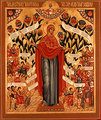Difference between revisions of "Icons of the Theotokos"
(just a start) |
m |
||
| Line 1: | Line 1: | ||
{{stub}} | {{stub}} | ||
| − | Theologically, the '''icons of the [[Theotokos]]''' represent the first human being who realized goal of the [[Incarnation]]: the [[deification]] of man. This is in contrast | + | Theologically, the '''icons of the [[Theotokos]]''' represent the first human being who realized the goal of the [[Incarnation]]: the [[theosis|deification]] of man. This is in contrast to the icons of [[Christ]], the basis for all [[iconography]], representing God who became man. |
==Number of types== | ==Number of types== | ||
| − | The calendar of the [[ | + | The calendar of the [[Church of Russia|Russian Church]], where iconography of the Virgin is highly developed, mentions 260 of her icons noted for miracles and celebrated liturgically. |
| + | |||
The [[Menaion]] of Sergius numbers the designations of Theotokos icons at 700. | The [[Menaion]] of Sergius numbers the designations of Theotokos icons at 700. | ||
==History== | ==History== | ||
| − | The tradition attributes St. [[Luke]] with painting the first icons of the Theotokos. We know of three types he painted | + | The tradition attributes St. [[Apostle Luke|Luke]] with painting the first icons of the Theotokos. We know of three types he painted: "Umilenie" (Our Lady of Tenderness), "Hodigitria" (She who leads the way), and a third type, of her without a child. |
==Icons== | ==Icons== | ||
<gallery> | <gallery> | ||
| Line 16: | Line 17: | ||
</gallery> | </gallery> | ||
==Source== | ==Source== | ||
| − | ''Theology of the Icon'' by Leonid Ouspensky ISBN 0-88141-124-8 | + | *''Theology of the Icon'' by Leonid Ouspensky ISBN 0-88141-124-8 |
[[Category:About Icons]] | [[Category:About Icons]] | ||
Revision as of 17:20, May 18, 2006
Theologically, the icons of the Theotokos represent the first human being who realized the goal of the Incarnation: the deification of man. This is in contrast to the icons of Christ, the basis for all iconography, representing God who became man.
Contents
Number of types
The calendar of the Russian Church, where iconography of the Virgin is highly developed, mentions 260 of her icons noted for miracles and celebrated liturgically.
The Menaion of Sergius numbers the designations of Theotokos icons at 700.
History
The tradition attributes St. Luke with painting the first icons of the Theotokos. We know of three types he painted: "Umilenie" (Our Lady of Tenderness), "Hodigitria" (She who leads the way), and a third type, of her without a child.
Icons
Our Lady of Kazan (Hodigitria)
Theotokos of Vladimir (Umilenie)
Source
- Theology of the Icon by Leonid Ouspensky ISBN 0-88141-124-8



